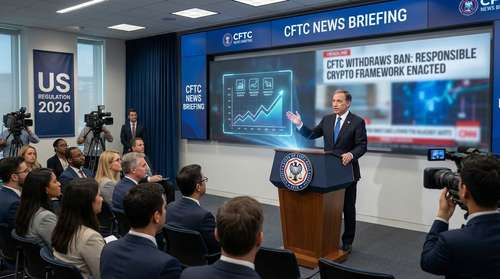In a challenge to the Federal Reserve's digital dollar ambitions, five US senators opposed the Biden administration's plans for a digital dollar.
The senators have sponsored legislation to ban Central Bank Digital Currencies (CBDCs), citing concerns over potential surveillance and infringements on citizens' freedom.
On February 26, U.S. Senator Ted Cruz spearheaded this unified opposition, accompanied by Senators Bill Hagerty, Rick Scott, Ted Budd, and Mike Braun.
Together, they introduced the CBDC Anti-Surveillance State Act to challenge the Federal Reserve's authority to implement a CBDC.
The senators fear that the proposed CBDC could be designed to surveil citizens, raising apprehensions about privacy violations and potential threats to personal freedom.
Senator Cruz's Call for Congressional Clarification
Senator Cruz took the lead in demanding that Congress explicitly clarify that the Federal Reserve lacks the authority to implement a CBDC.

The proposed legislation specifically restricts the Federal Reserve's authority "to offer certain products or services directly to an individual" and seeks to prohibit the use of central bank digital currency for monetary policy, among other purposes.
Senator Budd emphasized the importance of safeguarding financial privacy and committed to halting any move toward establishing a CBDC.
In his announcement on the legislation filing, Senator Cruz described CBDC as "government-controlled programmable money."
He argued that such a currency could collect intimate personal details on citizens, potentially enabling the tracking and freezing of funds for any reason.
This concern aligns with broader fears regarding the implications of a CBDC on individual privacy and financial autonomy.
If the legislation is enacted into law, it would not only serve as a ban on current CBDC initiatives but also establish a requirement for Congress to authorize any future issuance of CBDC.
This legislative safeguard aims to prevent the Federal Reserve from evolving into a retail bank, ensuring a more controlled and transparent approach to the potential introduction of a digital dollar.
Broad Support and Endorsements for CBDC Opposition
The collective effort of the five senators has garnered support from various quarters, reflecting the magnitude of concerns surrounding CBDC implementation.
In addition to the senators, the legislation has received endorsements from five prominent associations: Heritage Action for America (HAFA), the Blockchain Association, the American Bankers Association (ABA), the Independent Community Bankers Association (ICBA), and the Club for Growth (CFG).
These endorsements underline the shared belief across political and industry spectrums that caution and stringent regulations are necessary before venturing into the uncharted territory of CBDCs.
Adding another layer to the opposition, former President Donald Trump, a key figure eyeing the 2024 presidential election, has pledged to "never allow" the establishment of an in-house CBDC.
Trump credited Vivek Ramaswamy for bringing attention to the potential negative impacts of CBDCs.
This high-profile endorsement further fuels the momentum against the Biden administration's plans and strengthens the resolve of those opposing the implementation of a CBDC.




